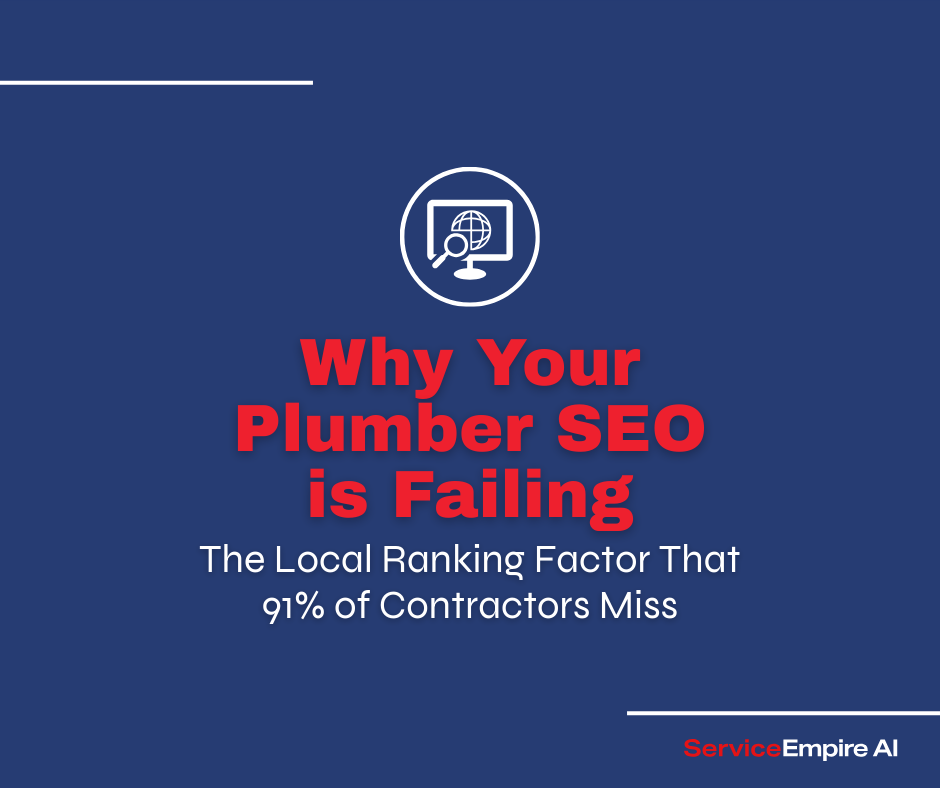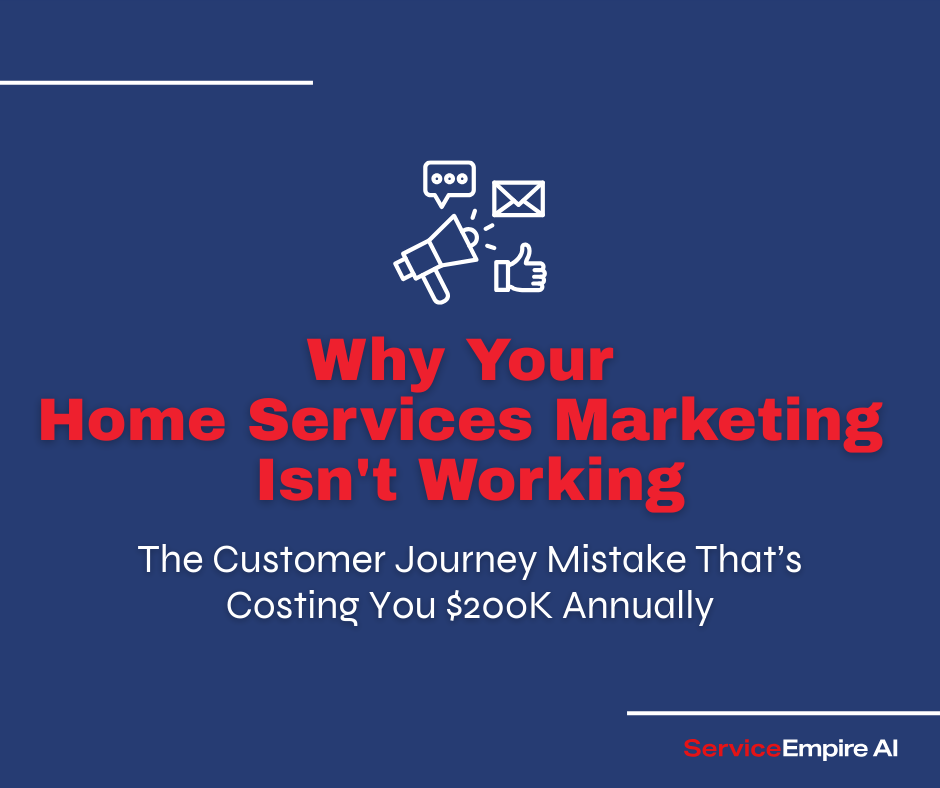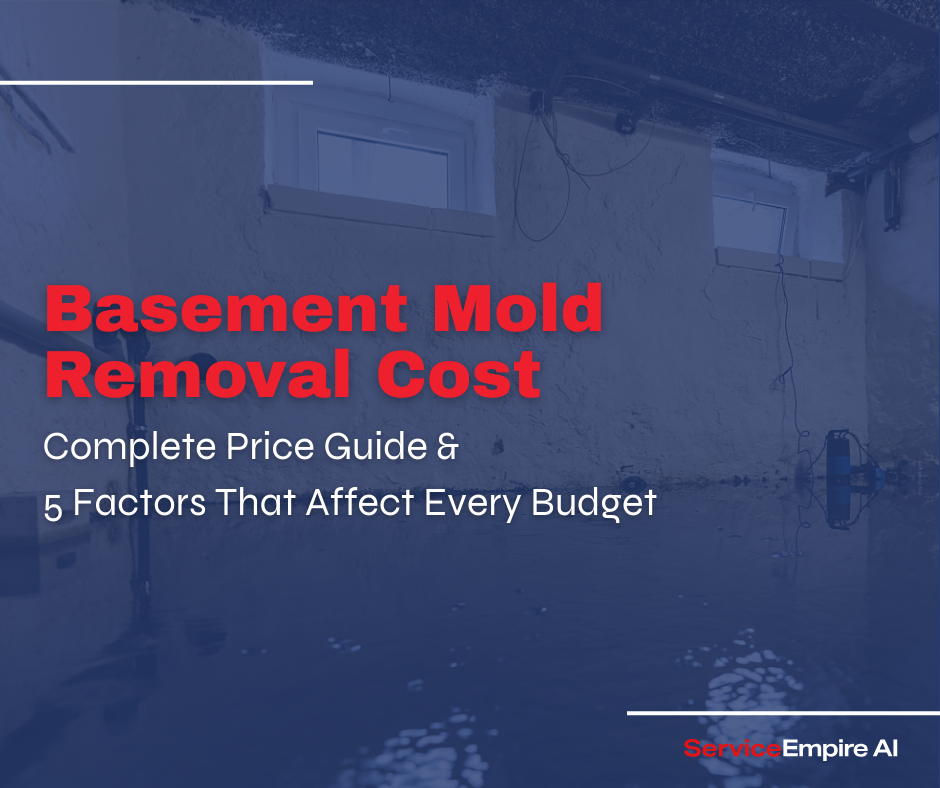
When a plumbing emergency happens, the vast majority of homeowners go straight to Google. Searches like “emergency plumber near me” have jumped 210% in the last three years. This trend gives plumbing businesses a big chance to grow—but only if they show up in search results. Since 93% of people never go past page one, plumber SEO is now the most important marketing tool for long-term success.
Unlike paid ads that stop working when you stop paying, SEO builds lasting digital assets that keep bringing in leads. This guide will show proven ways to boost your local rankings, get more quality leads, and become the top plumbing provider in your area. Whether you serve homes, businesses, or specialize in a niche, the right plumber SEO strategy can transform your online visibility and grow your business for the long haul.
Why SEO Matters for Plumbers
In today's digital marketplace, the customer journey for plumbing services has fundamentally changed. Understanding this journey is critical for plumbing businesses that want to thrive in an increasingly competitive landscape.
The Digital Customer Journey for Plumbing Services
- Emergency Recognition: Customer has a plumbing emergency or service need
- Search Initiation: Searches "plumber near me" or "emergency plumber in [city]"
- Results Evaluation: Scans Google's local map pack and top organic results
- Reputation Check: Reviews ratings, testimonials, and services offered
- Website Verification: Visits 2-3 websites to check credibility and services
- Contact Decision: Calls or submits a form to the most trustworthy option
Without effective SEO, your plumbing business simply doesn't appear during this critical customer journey, regardless of your expertise or service quality.
Competitive Landscape Analysis
The plumbing industry is increasingly competitive online:
- Average plumbing business now allocates 40% of marketing budget to digital channels
- Top-performing plumbers invest thousands monthly on digital marketing
- First-page Google rankings generate at least 10x more clicks than second-page positions
- 68% of plumbing searches result in same-day phone calls
SEO vs. Traditional Advertising
For plumbing contractors, SEO offers distinct advantages over traditional marketing:
Check out this article if you want to learn more about Google Local Ads.
Plumber SEO Fundamentals
Before diving into specific strategies, understanding the core factors that influence your plumbing business's search visibility is essential.
Key Ranking Factors for Plumbing Services
Google evaluates service businesses differently than e-commerce or informational websites, with emphasis on:
- Proximity: Physical location relative to the searcher
- Relevance: Service match to search intent
- Prominence: Online reputation and authority
- Website Experience: User-friendly, informative, and mobile-optimized
- Business Information Consistency: NAP (Name, Address, Phone) across the web
Local SEO vs. Organic SEO
Plumbing businesses need both approaches:
Local SEO targets the "Map Pack" (top 3 local listings) through:
- Google Business Profile optimization
- Local citation building
- Review generation
- Location-specific content
Organic SEO targets traditional search results through:
- Website content quality and relevance
- Technical website performance
- Backlink acquisition
- User experience signals
Mobile Optimization Priority
With the majority of emergency plumbing searches occurring on mobile devices, mobile optimization is non-negotiable:
- Fast loading speed (under 3 seconds)
- Tap-to-call functionality
- Simple contact forms
- Clear service area information
- Streamlined emergency service pages
Voice Search Consideration
As smart speakers and voice assistants grow in popularity, plumbers should optimize for conversational queries:
- "Where can I find a 24-hour plumber near me?"
- "Who's the best plumber in [city] for water heater replacement?"
- "How quickly can a plumber fix a burst pipe?"
Plumber Keyword Research
Effective keyword research is truly the foundation of successful plumber SEO. Targeting the right search terms ensures you attract qualified leads rather than casual browsers.
High-Value Plumbing Service Keywords
Core keywords for plumbers typically fall into these categories:
Service-Based Keywords:
- "plumbing repair"
- "plumber services"
- "licensed plumber"
- "emergency plumber"
- "residential plumber"
- "commercial plumber"
Problem-Based Keywords:
- "clogged drain"
- "water heater leaking"
- "broken pipe repair"
- "toilet won't flush"
- "low water pressure"
Location-Based Keywords:
- "plumber [city]"
- "plumbing service near me"
- "licensed plumber in [neighborhood]"
- "best plumber [city]"
Local Keyword Modifiers
This is where 91% of contractors miss. They just complete their Google business profile, but they don't enhance their website with core keywords that include local modifiers:
- Geographic terms (cities, neighborhoods, counties, tri-state areas)
- "Near me" modifiers
- Landmark references (mountains, lakes, rivers, etc)
- Zip codes for densely populated areas
Specialty Plumbing Keywords
Capture niche service opportunities:
- "tankless water heater installation"
- "sewer line replacement"
- "bathroom remodeling plumber"
- "commercial kitchen plumbing"
- "backflow prevention testing"
- "water softener installation"
Long-Tail Keyword Strategies
Long-tail keywords (longer, more specific phrases) typically convert at 2.5× higher rates than short keywords. Examples for plumbers include:
- "how much does it cost to replace a hot water heater"
- "licensed plumber for garbage disposal installation"
- "emergency plumber for burst pipe same-day service"
- "24-hour residential plumber [city]"
Optimizing Your Plumbing Website Structure
Your website architecture directly impacts both user experience and search engine crawlability, making it a critical component of plumber SEO.
Essential Pages for Plumbing Contractors
A well-structured plumber website should include:
- Homepage: Overview of services, credentials, and unique value proposition
- Service Pages: Dedicated pages for each core service (repairs, installations, emergency)
- Location Pages: Geo-targeted pages for each service area
- About Page: Licensing information, certifications, and company history
- Portfolio/Projects: Showcasing past plumbing work with before/after images
- Testimonials/Reviews: Social proof from satisfied customers
- Blog/Resources: Educational content addressing common plumbing issues
- Contact Page: Multiple contact options, emergency information, and service area map
Service Page Optimization
Service pages drive conversions when properly optimized:
- Descriptive URL structure (e.g., example.com/services/water-heater-replacement)
- Service-specific keywords in title tags, headings, and content
- Clear scope of service descriptions
- Pricing information or factors affecting cost
- Relevant images with proper alt text
- FAQ sections addressing common questions
- Strong call-to-action (CTA) elements
Multi-Location Strategy
For plumbers serving multiple areas:
- Create individual location pages for each city/area served
- Include location-specific content, not duplicate content with changed city names
- Embed Google Map for each location
- Mention local landmarks, neighborhoods, and service boundaries
- Include location-specific testimonials when possible
Mobile-First Design Principles
Given the emergency nature of many plumbing searches:
- Prominent phone number visible without scrolling
- "Click-to-call" functionality
- Simplified navigation
- Compressed images for faster loading
- Limited form fields for mobile inquiries
- Location detection features
On-Page SEO for Plumbers
On-page optimization ensures your website communicates effectively with both users and search engines about your plumbing services.
Title Tag and Meta Description Optimization
Title tags should follow this structure:
- Primary Service + Location + Brand (e.g., "Emergency Plumber in Portland | Smith Plumbing")
- Keep under 60 characters to avoid truncation
Meta descriptions should:
- Include a value proposition and call to action
- Mention licenses, availability, or guarantees
- Stay between 140-155 characters
- Incorporate primary keywords naturally
Header Structure Best Practices
Properly structured headers help both user scanning and search engine understanding:
- H1: Main service/page focus (use only once per page)
- H2: Major service categories or benefit sections
- H3: Specific services, FAQs, or feature details
- H4-H6: Supplementary information organization
Schema Markup Implementation
Schema markup helps search engines understand your business details:
- LocalBusiness schema with proper plumbing business categorization
- Service schema for each plumbing service offered
- Review schema for displaying star ratings in search results
- FAQ schema for common plumbing questions
- Price schema for standardized services (when applicable)
Technical SEO Essentials
Don't overlook these technical elements:
- XML sitemap submission
- Robots.txt optimization
- Canonical tags to prevent duplicate content
- Proper URL structure (short, descriptive URLs)
- Image optimization (file size and alt text)
- Site speed optimization (aim for <3 second load time)
Google Business Profile Optimization for Plumbers
Your Google Business Profile (formerly Google My Business) is perhaps the single most important asset for local plumber SEO.
Profile Completion and Verification
Maximize your profile's effectiveness:
- Verify your business through Google's verification process
- Complete 100% of profile sections
- Select "Plumber" as primary category
- Add relevant secondary categories (e.g., "Emergency Plumbing Service")
- Upload your logo and minimum 10 high-quality images
- Set accurate business hours, including emergency availability
Service Area Settings
For service-area businesses without a customer-facing location:
- Hide your exact address if operating from home
- Define service areas by cities or zip codes
- Be realistic about service boundaries (typically 20-30 mile radius)
- Consider creating a separate profile for distant service areas
Photo Optimization
High quality photos can impact engagement with your profile:
- Professional headshots of technicians
- Service vehicles with clear branding
- Before/after project photos
- Team photos showing professionalism
- Interior office/shop photos
- Add new photos monthly (profiles with 100+ photos get 520% more calls)
Review Generation Strategies
Reviews directly impact ranking and conversion:
- Create a simple review generation process
- Send follow-up emails with review links
- Train technicians to request reviews after successful service
- Respond to all reviews (positive and negative)
- Showcase 5-star reviews on your website
Local Citation Building for Plumbers
Citations (mentions of your business name, address, and phone number) on other websites serve as trust signals for local search.
Essential Citation Sources for Plumbers
Focus first on these high-impact directories:
- General directories: Google Business Profile, Bing Places, Yelp, Facebook
- Industry-specific: HomeAdvisor, Angi, Thumbtack, Houzz
- License verification sites: State contractor databases
- Local directories: Chamber of Commerce, local business associations
NAP Consistency
Maintain identical business information across all platforms:
- Exact business name (including LLC, Inc., etc. if in legal name)
- Precise address format
- Consistent phone format (e.g., always with or without parentheses)
- Identical website URL (including http/https and www/non-www version)
Citation Building Process
Follow this systematic approach:
- Audit existing citations using a tool like BrightLocal or Moz Local
- Correct inconsistencies in current listings
- Build new citations starting with highest-authority sites
- Add industry-specific directory listings
- Create local media and business association listings
- Monitor and update citations quarterly
Content Marketing for Plumbing Contractors
Strategic content creation drives organic traffic and establishes expertise for plumbing contractors.
Service Page Content Development
To create high-converting service pages, include 800–1,500 words of detailed content that clearly explains your services and what customers can expect. Share transparent pricing or pricing factors so visitors know what influences the cost. Highlight your team’s credentials, qualifications, and safety or compliance standards to build trust. Use a helpful FAQ section to answer common customer questions and remove doubts. End with strong, repeated calls-to-action that guide visitors to contact you, book a service, or request a quote.
Blog Content Strategy
Develop content that attracts and educates potential customers:
DIY vs. Professional Content:
- "When to Call a Plumber vs. DIY Plumbing Projects"
- "5 Plumbing Repairs That Should Never Be DIY"
- "Warning Signs Your Water Heater Needs Professional Attention"
Water Conservation Content:
- "10 Simple Ways to Reduce Your Water Bill"
- "Smart Water-Saving Fixtures Worth Installing"
- "How to Find and Fix Hidden Water Leaks"
Seasonal Content:
- "Preparing Your Plumbing for Winter"
- "Spring Plumbing Maintenance Checklist"
- "Prevent Summer Vacation Plumbing Disasters"
Emergency Preparation Content:
- "How to Shut Off Your Water in a Plumbing Emergency"
- "Creating a Home Plumbing Emergency Kit"
- "What to Do Before the Plumber Arrives"
Content Distribution
Maximize content reach through:
- Email newsletters to customer database
- Social media sharing with visual elements
- Local community group sharing (Nextdoor, Facebook Groups)
- Cross-promotion with complementary businesses
- Inclusion in service follow-up emails
Reputation Management for Plumbers
Online reputation directly impacts both rankings and conversion rates for plumbing contractors.
Acquire More Reviews
Build a simple, consistent process for collecting reviews by creating a review funnel that includes follow-up emails and direct links to review platforms. Train your technicians to ask for reviews at the end of each job to encourage real-time feedback. To streamline the process, consider using review management software to automate requests and tracking.
Manage Negative Reviews
Respond to negative reviews quickly—ideally within 24 hours—and thank the customer for their feedback. Address the specific concern, take responsibility if needed, and aim to move the resolution offline. Always follow up to confirm the issue has been resolved and the customer is satisfied.
Showcase Great Reviews on Your Website
Feature reviews in multiple places on your website, including a dedicated testimonials page and service-specific sections. Add star ratings in your site header and use review schema markup to boost visibility in search results. For high-value services, video testimonials can add powerful social proof and build trust.
Measuring SEO Success for Plumbers
Track these key performance indicators to gauge SEO effectiveness:
Essential SEO KPIs for Plumbing Contractors
Monitor these metrics monthly:
- Organic search traffic
- Google Business Profile views and actions
- Keyword rankings for target terms
- Phone calls from organic search
- Form submissions from organic search
- Cost per lead from organic search
- Conversion rate by landing page
Tracking Setup
Implement proper tracking systems:
- Google Analytics 4 configuration
- Google Search Console connection
- Call tracking software integration
- Form submission tracking
- Proper UTM parameter usage
- Conversion goal setup
- Regular reporting dashboard
ROI Calculation
Here's how to determine true return on SEO investment:
- Track average job value from organic leads
- Calculate customer lifetime value
- Measure cost per acquisition
- Compare to other marketing channels
- Assess long-term growth trends
Conclusion
SEO for plumbers isn't about quick fixes or manipulating search engines—it's about authentically representing your plumbing business online and aligning with how customers search for your services. By implementing the strategies in this guide, plumbing contractors can build sustained visibility that generates qualified leads month after month.
The most successful plumbers approach SEO as an ongoing investment rather than a one-time project. While results may take 3-6 months to fully materialize, the long-term benefits of organic search visibility deliver consistent returns long after the initial optimization work.
Remember that plumber SEO is a competitive advantage that compounds over time. Each improvement—whether in your website content, online reviews, or local citations—builds upon previous efforts to strengthen your digital foundation and help your plumbing business thrive.
FAQ Section
How long does SEO take to work for a plumbing business?
Most plumbing contractors begin seeing meaningful results within 3-6 months. Local map pack results often improve faster (2-3 months) with proper Google Business Profile optimization, while organic rankings for competitive terms may take 6-12 months to reach page one. The specific timeline depends on your market competitiveness, current website condition, and implementation thoroughness.
What's the average cost of SEO for plumbers?
SEO investment for plumbing contractors typically ranges from $1,000-$2,500 monthly for professional services or 15-20 hours monthly for in-house work. Costs vary based on market size, competition level, and campaign aggressiveness. Most plumbing businesses see positive ROI within 4-6 months, with long-term returns significantly outperforming traditional advertising channels.
Should plumbers handle SEO in-house or hire an agency?
This depends on your resources and expertise:
In-house advantages:
- Better industry knowledge
- Closer alignment with business goals
- Lower direct costs
Agency advantages:
- Specialized expertise
- Established processes
- Time-efficient for business owners
- Access to premium tools and resources
Many plumbing contractors start with professional SEO consultation then gradually transition some efforts in-house as they develop expertise.
What are the most important SEO factors for plumbing contractors?
The highest-impact elements for plumber SEO are:
- Google Business Profile optimization and review generation
- Website mobile usability and loading speed
- Service page content quality and structure
- Local citation accuracy and completeness
- On-page optimization for service-focused keywords
While all aspects matter, focusing on these elements first typically delivers the fastest results for plumbing businesses.
How can plumbers compete with large national companies in search?
Local plumbing contractors can compete with national brands in SEO.
One of the best ways is to target specific local keywords that match your services and locations to boost search visibility. Build strong review profiles, share local content, and highlight past projects in the area. Get involved in the community and aim for local press coverage to strengthen your brand’s local presence.
National companies often can't match the local relevance of a well-optimized local plumbing business, particularly in the Map Pack results.




.png)

